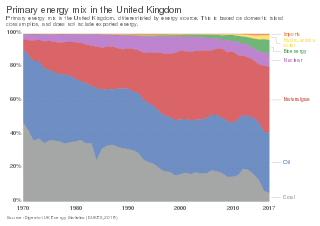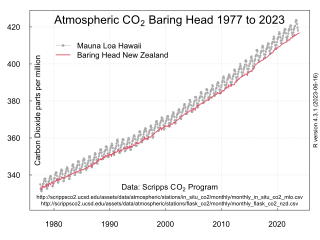
The European Union Emissions Trading System is a carbon emission trading scheme which began in 2005 and is intended to lower greenhouse gas emissions by the European Union countries. Cap and trade schemes limit emissions of specified pollutants over an area and allow companies to trade emissions rights within that area. The EU ETS covers around 45% of the EU's greenhouse gas emissions.
Various energy conservation measures are taken in the United Kingdom.

The energy policy of the United Kingdom refers to the United Kingdom's efforts towards reducing energy intensity, reducing energy poverty, and maintaining energy supply reliability. The United Kingdom has had success in this, though energy intensity remains high. There is an ambitious goal to reduce carbon dioxide emissions in future years, but it is unclear whether the programmes in place are sufficient to achieve this objective. Regarding energy self-sufficiency, UK policy does not address this issue, other than to concede historic energy security is currently ceasing to exist.

Aircraft engines produce gases, noise, and particulates from fossil fuel combustion, raising environmental concerns over their global effects and their effects on local air quality. Jet airliners contribute to climate change by emitting carbon dioxide, the best understood greenhouse gas, and, with less scientific understanding, nitrogen oxides, contrails and particulates. Their radiative forcing is estimated at 1.3–1.4 that of CO2 alone, excluding induced cirrus cloud with a very low level of scientific understanding. In 2018, global commercial operations generated 2.4% of all CO2 emissions.

The Climate Change Act 2008 is an Act of the Parliament of the United Kingdom. The Act makes it the duty of the Secretary of State to ensure that the net UK carbon account for all six Kyoto greenhouse gases for the year 2050 is at least 100% lower than the 1990 baseline, toward avoiding dangerous climate change. The Act aims to enable the United Kingdom to become a low-carbon economy and gives ministers powers to introduce the measures necessary to achieve a range of greenhouse gas reduction targets. An independent Committee on Climate Change was created under the Act to provide advice to UK Government on these targets and related policies. In the act Secretary of State refers to the Secretary of State for Energy and Climate Change.

Climate change in New Zealand involves historical, current and future changes in the climate of New Zealand; and New Zealand's contribution and response to global climate change. Summers are becoming longer and hotter, and some glaciers have melted completely and others have shrunk. In 2021, the Ministry for the Environment estimated that New Zealand's gross emissions were 0.17% of the world's total gross greenhouse gas emissions. However, on a per capita basis, New Zealand is a significant emitter, the sixth highest within the Annex I countries, whereas on absolute gross emissions New Zealand is ranked as the 24th highest emitter.

Climate change is impacting the environment and human population of the United Kingdom (UK). The country's climate is becoming warmer, with drier summers and wetter winters. The frequency and intensity of storms, floods, droughts and heatwaves is increasing, and sea level rise is impacting coastal areas. The UK is also a contributor to climate change, having emitted more greenhouse gas per person than the world average. Climate change is having economic impacts on the UK and presents risks to human health and ecosystems.

Climate change in Scotland is causing a range of impacts on Scotland, and its mitigation and adaptation is a matter for the devolved Scottish Parliament. Climate change has already changed timings of spring events such as leaf unfolding, bird migration and egg-laying. Severe effects are likely to occur on biodiversity.

In 2021, net greenhouse gas (GHG) emissions in the United Kingdom (UK) were 427 million tonnes (Mt) carbon dioxide equivalent, 80% of which was carbon dioxide itself. Emissions increased by 5% in 2021 with the easing of COVID-19 restrictions, primarily due to the extra road transport. The UK has over time emitted about 3% of the world total human caused CO2, with a current rate under 1%, although the population is less than 1%.

Climate change has resulted in an increase in temperature of 2.3 °C (2022) in Europe compared to pre-industrial levels. Europe is the fastest warming continent in the world. Europe's climate is getting warmer due to anthropogenic activity. According to international climate experts, global temperature rise should not exceed 2 °C to prevent the most dangerous consequences of climate change; without reduction in greenhouse gas emissions, this could happen before 2050. Climate change has implications for all regions of Europe, with the extent and nature of impacts varying across the continent.

The Climate Change Authority (CCA) is an Australian Government statutory agency responsible for providing independent advice to government on climate change policy. It was established by and operates under the Climate Change Authority Act 2011. The Authority commenced operations on 1 July 2012. It was setup by Julia Gillard and has withstood concerted efforts for its disestablishment. The Abbott government campaigned for the CCA's abolishment, having successfully abolished the Climate Commission.

Roderick Marshall Carr is a New Zealand businessman and administrator. He retired from his position as Vice-Chancellor of the University of Canterbury in 2019 and has been a chairman of the board of the Reserve Bank of New Zealand, and a director of Lyttelton Port Company, Taranaki Investment Management and Canterbury Employers’ Chamber of Commerce. In 2019, Carr was appointed as Chair-designate for the Climate Change Commission and has been confirmed in that role for five years following the passing of the Climate Change Response Amendment Act. Carr has been partially sighted and legally blind since birth.
The German Climate Action Plan 2050 is a climate protection policy document approved by the German government on 14 November 2016. The plan outlines measures by which Germany can meet its various national greenhouse gas emissions reduction goals through to 2050 and service its international commitments under the 2016 Paris Climate Agreement. The Federal Ministry for the Environment, Nature Conservation, Building and Nuclear Safety (BMUB), under minister Barbara Hendricks, led the development of the plan. The plan was progressively watered down since a draft was first leaked in early May 2016. Projections from the environment ministry in September 2016 indicate that Germany will likely miss its 2020 climate target.

Climate change is leading to long-term impacts on agriculture in Germany, more intense heatwaves and coldwaves, flash and coastal flooding, and reduced water availability. Debates over how to address these long-term challenges caused by climate change have also sparked changes in the energy sector and in mitigation strategies. Germany's energiewende has been a significant political issue in German politics that has made coalition talks difficult for Angela Merkel's CDU.

The European Green Deal, approved in 2020, is a set of policy initiatives by the European Commission with the overarching aim of making the European Union (EU) climate neutral in 2050. The plan is to review each existing law on its climate merits, and also introduce new legislation on the circular economy, building renovation, biodiversity, farming and innovation.
The UK Climate Assembly is a citizens' group formed in the United Kingdom in January 2020 whose goal was to issue recommendations for how the UK could satisfy its climate change law—the Climate Change Act amendment passed on 27 June 2019 mandates that the country must reach net-zero carbon emissions by 2050. It was formed of 108 UK citizens, chosen to be representative of the population. Its last meeting was delayed to May due to the COVID-19 pandemic and the group's report was published in September 2020.
The High Council on Climate is an independent executive council in the Government of France announced by Emmanuel Macron in 2018 and created on 14 May 2019. The council is meant to address the countries climate policy, and produce reports on the progress of France towards its climate commitments. The organization was formed separately from the National Council for Ecological Transition which was formed to create a social dialogue body responding to groups, like the Yellow vests movement.

The Climate Change Commission is an independent Crown entity that advises the New Zealand Government on climate change policy and monitors the government's progress towards New Zealand's emission reduction goals within the framework of the Climate Change Response Amendment Act. The Commission was established as the successor to the Interim Climate Change Committee following the passage of the Zero Carbon Act in November 2019.
Various environmental issues are facing Wales, including climate change, pollution and ecosystem loss, and the various policies to address them.

Global net zero emissions describes the state where emissions of carbon dioxide due to human activities and removals of these gases are in balance over a given period. It is often called simply net zero. In some cases, emissions refers to emissions of all greenhouse gases, and in others it refers only to emissions of carbon dioxide. To reach net zero targets requires actions to reduce emissions. One example would be by shifting from fossil fuel energy to sustainable energy sources. Organizations often offset their residual emissions by buying carbon credits.














